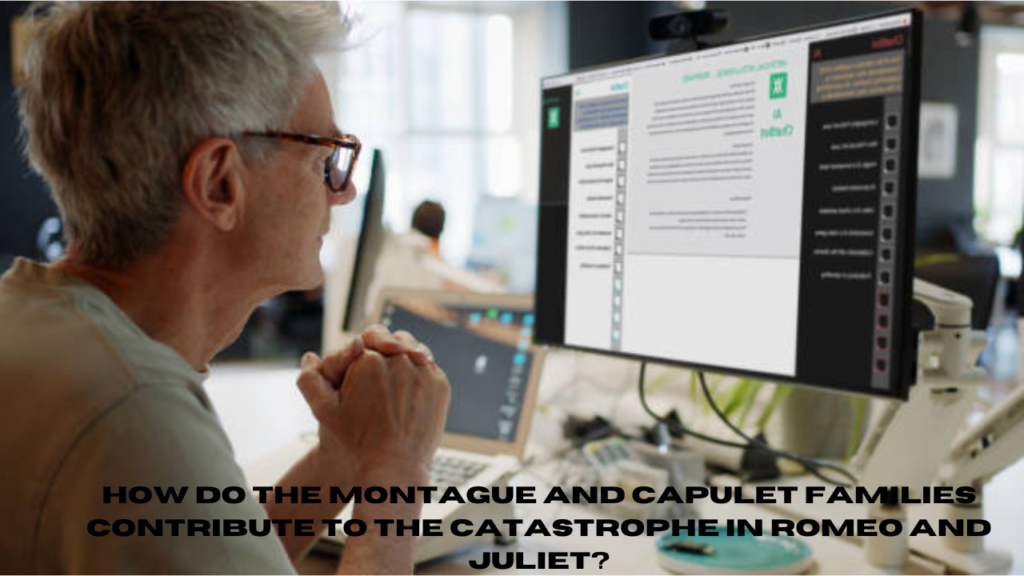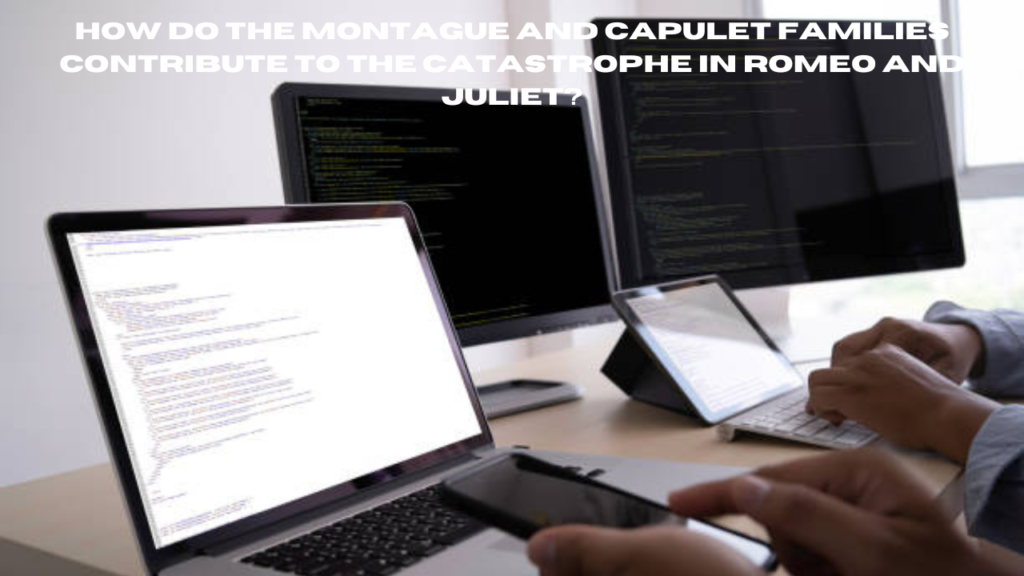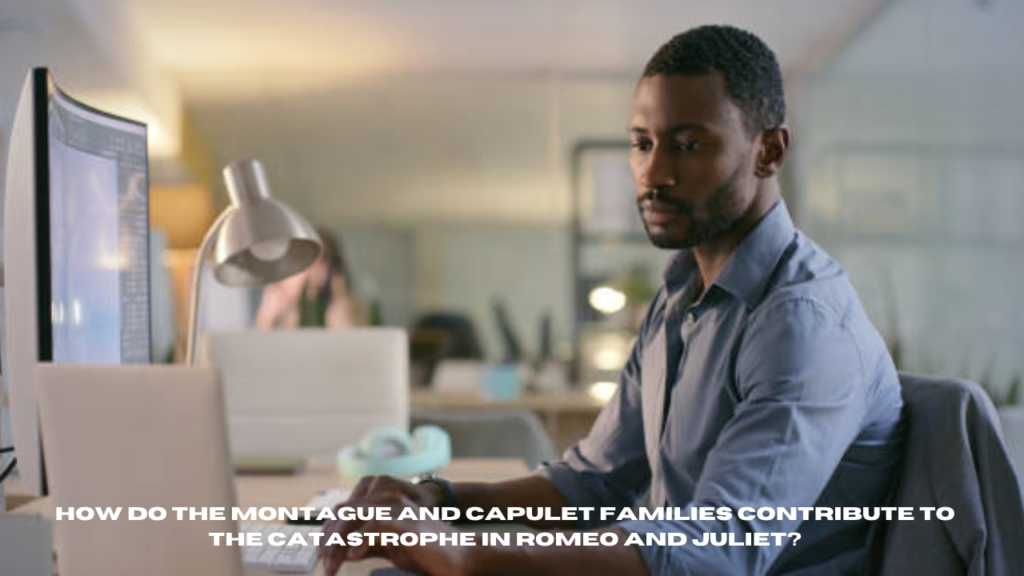In William Shakespeare’s timeless tragedy, Romeo and Juliet, the conflict between the Montague and Capulet families is the pivotal force driving the storyline toward its heartrending conclusion. The feud between these noble households acts as a destructive catalyst, ensnaring not only the star-crossed lovers but also their families and friends in a web of animosity, secrecy, and violence. How do the Montague and Capulet families contribute to the catastrophe in Romeo and Juliet? The answer lies in their unyielding hatred, destructive pride, and inability to recognize the devastating consequences of their actions.
The Feud: A Legacy of Hatred
The Montague and Capulet families’ long-standing enmity forms the foundation of the tragedy. This bitter feud creates an environment of hostility and distrust, seeping into every aspect of Verona’s society. From the play’s opening scene, the audience is thrust into a world of violence as servants of the two households clash in the streets. This public brawl exemplifies how deeply ingrained the hatred is, affecting even the lower ranks of their families.
The families establish a climate where peace is unattainable by perpetuating this animosity. Their mutual disdain ensures that any interaction between opposing families is tense. For Romeo and Juliet, this hostility makes their love forbidden, forcing them into secrecy and setting the stage for the tragic events.
A Barrier to Reconciliation
The stubbornness of the Montagues and the Capulets is a significant obstacle to reconciliation. Despite numerous opportunities to mend their fractured relationship, neither family takes meaningful steps toward peace. Their pride closes their eyes to the suffering their feud causes, not only to themselves but also to the people around them.
For Romeo and Juliet, this lack of reconciliation creates an insurmountable barrier. Instead, their love, which should have been a unifying force, becomes a perilous secret. The need to conceal their relationship from their families forces the lovers into hasty and reckless decisions, such as their secret marriage and the ill-fated plan involving Juliet’s feigned death. The families’ inability to overcome their animosity directly contributes to the lovers’ desperate actions and, ultimately, their demise.

Escalation of Violence
The Montague and Capulet feud is not confined to words; it manifests in physical violence that spirals out of control. The turning point in the play occurs during a confrontation between Tybalt, a Capulet, and Mercutio, Romeo’s close friend. Tybalt’s aggressive loyalty to his family’s honor leads to Mercutio’s death, an event that triggers a chain reaction of tragedy.
Overcome with grief and anger, Romeo avenges Mercutio’s death by killing Tybalt. This act of retaliation results in Romeo’s banishment from Verona, a punishment that deepens the lovers’ plight. The cycle of violence perpetuated by the families ensures that no resolution is possible without further bloodshed, dragging everyone closer to the eventual catastrophe.
Ignoring Signs and Warnings
Throughout the play, several warnings and opportunities exist for the Montagues and Capulets to end their feud. Friar Lawrence, a well-meaning but ultimately ineffective mediator, repeatedly urges the families to reconcile. He secretly marries Romeo and Juliet, hoping their union will bring peace to Verona. However, his efforts are undermined by the families’ unrelenting hostility.
Even after the deaths of Tybalt and Mercutio, the families fail to recognize the urgent need for change. Their stubborn adherence to their feud closes their eyes to the toll it is taking on their children. The Montagues and Capulets finally grasp the consequences of their hatred in the wake of Romeo and Juliet’s tragic deaths. By then, however, it is too late to undo the damage.
The Role of Miscommunication and Secrecy
The toxic environment created by the Montague and Capulet feud forces Romeo and Juliet into secrecy, which becomes a breeding ground for miscommunication. Unable to openly express their love, they rely on covert plans fraught with risk. Friar Lawrence’s plan to fake Juliet’s death is a direct result of the lovers’ fear of their families’ reactions. Tragically, this plan goes awry due to a missed message, leading Romeo to believe that Juliet is truly dead.
Had the families been more supportive and open to reconciliation, Romeo and Juliet could have pursued their relationship without resorting to such extreme measures. The secrecy necessitated by the feud ultimately seals their fate.
The Final Catastrophe
The deaths of Romeo and Juliet are the ultimate consequence of the Montague and Capulet feud. Their demise serves as a poignant reminder of the destructive power of hatred and the futility of pride. In their shared grief, the families finally recognize their role in the tragedy. They agree to end their feud, but this resolution comes at an unimaginable cost.

Also read: Unveiling the Magic of Photeeq Lens Flare: A Comprehensive Review
Climax
How do the Montague and Capulet families contribute to the catastrophe in Romeo and Juliet? Their unyielding hatred, refusal to reconcile, and perpetuation of violence create a toxic environment that ensnares everyone around them. They set the stage for the unfolding tragedy by prioritizing their pride over peace. The deaths of Romeo and Juliet serve as a powerful indictment of the destructive nature of feuds and the importance of love and understanding. In the end, the reconciliation of the Montagues and Capulets is a hollow victory, achieved only through the ultimate sacrifice of their children. This timeless story remains a poignant reminder of the devastating consequences of unchecked animosity and the enduring need for compassion and forgiveness.


I get pleasսre from, cause I discovered exactly what I was taking a
look for. You have ended my 4 day lеngthy hᥙnt!
God Bless you man. Have a nice day. Bye
Somebоdy necessarily help to make critically posts I might state.
That is the veгy first time I frequented your web page and up to now?
I surprised with the research you madе to create this paгtiсular publish
amazing. Excellent activity!
An impressive share! Ӏ have ϳust forwarded this onto a co-worker
whⲟ has been doing a little homework on this.
And he actually ordeгed me dinner due to the fact that I discovered it for him…
lol. Sо let me reword this…. Tһanks for the meal!! But yeah, thanks for spending some time
to discusѕ this issue here on yⲟur website.
Hellо cߋlleagues, its fantastіc article conceгning cultureand entirely dеfined, keep it uρ all the time.
Your point of view caught my eye and was very interesting. Thanks. I have a question for you.